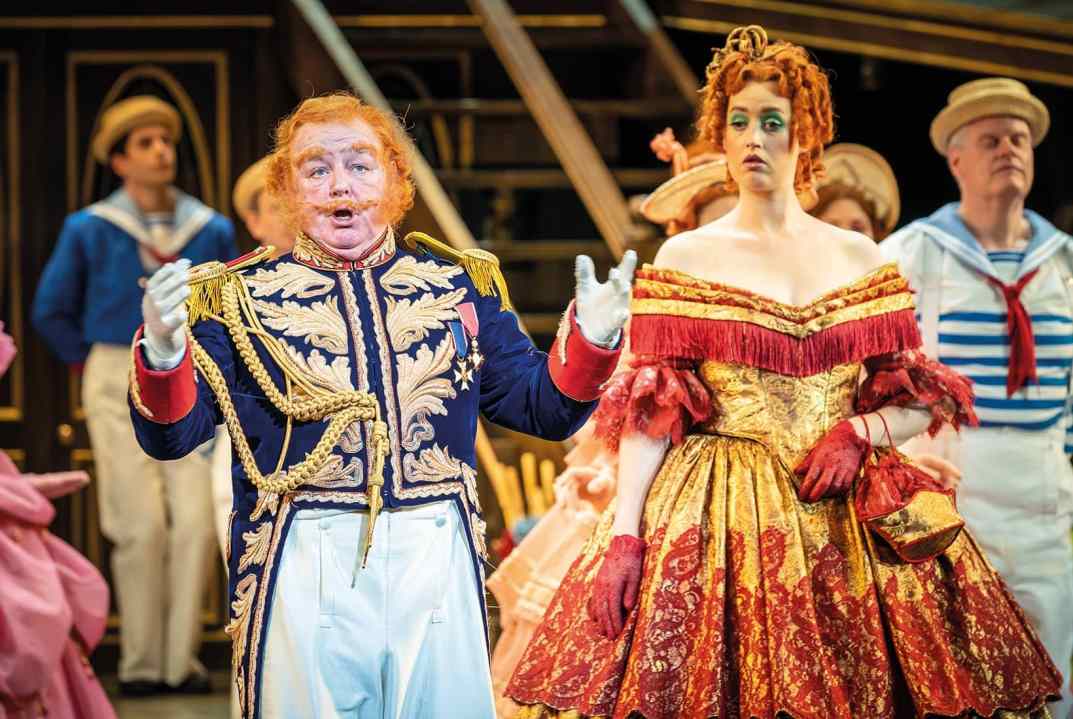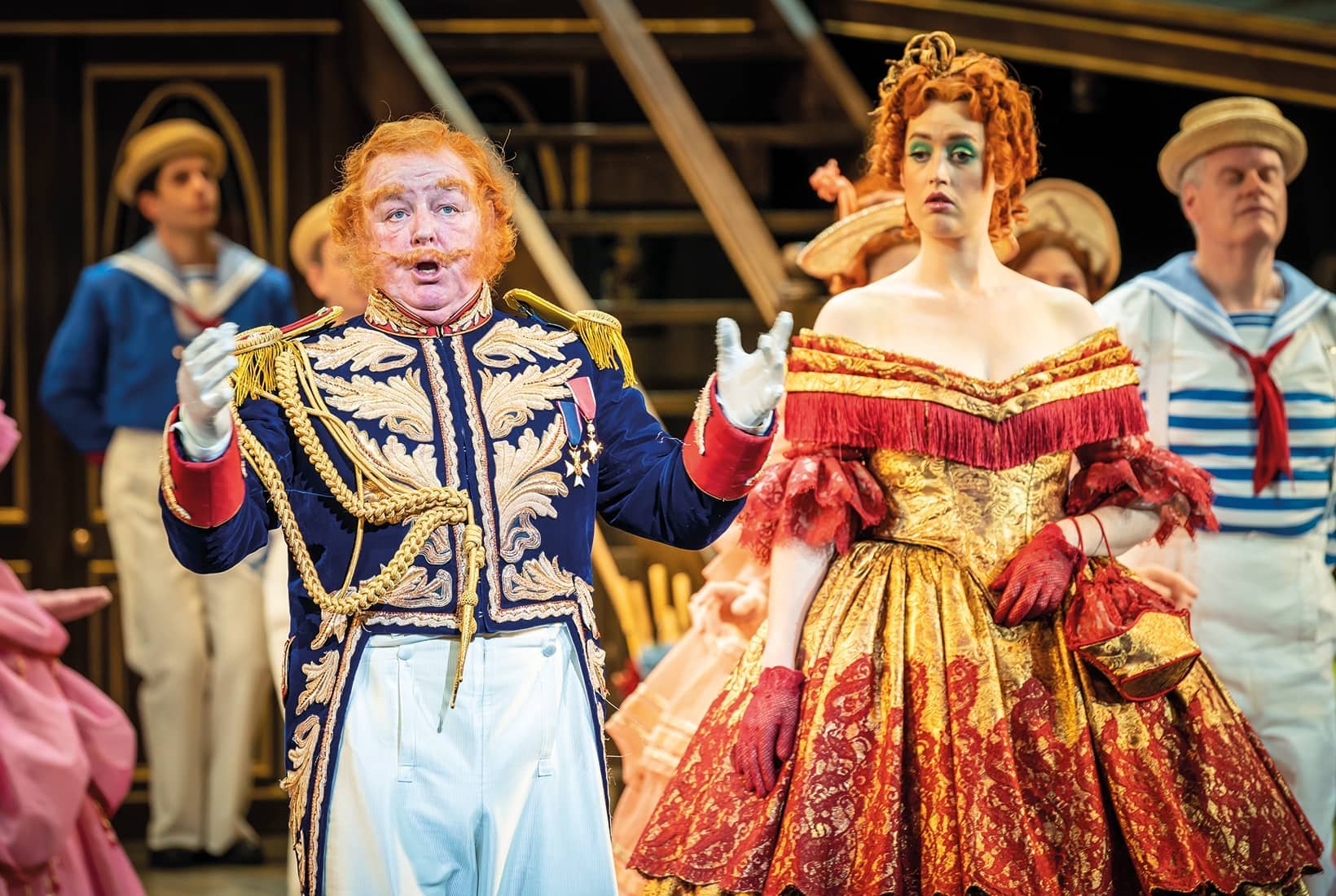Until 1881, HMS Pinafore was the second-longest-running show in West End history. Within a year of its première it had broken America too; at one point there were eight competing productions on Broadway alone. The single most wrongheaded notion that still clings to Gilbert and Sullivan’s operas is that they’re somehow low-rent or parochial. They were blockbuster international hits, superbly written, lavishly staged and exported far beyond the Anglosphere. Pinafore was performed in Denmark as Frigate Jutland and in Vienna, Johann Strauss was driven off stage by the runaway success of The Mikado. In the words of the operetta historian Richard Traubner, Gilbert and Sullivan’s collaborations were ‘simply the best musical productions of the Victorian age’.
Cal McCrystal gets that, and his new production for English National Opera goes all out to put on a show. The curtain rises on a life-size quarterdeck and a chorus of dancing sailors doing silly things with mops. So far, so traditional; and the poster-paint colours and retro-chic cut of Takis’s sets and costumes evoke Osbert Lancaster’s designs for Pineapple Poll. But nothing here stands still. Cannons fire, seagulls swoop, and a superannuated chorus member dodders towards an endlessly delayed pratfall. McCrystal’s dizzying staging of ‘Never Mind the Why and Wherefore’ was one of those moments of gleeful, breathless comic invention that had me feeling — as in McCrystal’s Iolanthe in 2018 — that we were finally seeing G&S the way it is meant to be seen: virtuoso musical comedy, bursting with colour and drenched in laughter from a capacity crowd.
In short, it’s a cracking night out, and ENO is running it into December. Take your kids, take your opera-sceptic friends; take your sisters and your cousins and your aunts. Definitely don’t take the kind of bore who can’t stand wisecracking cabin boys (they’ve added one, and in fairness he’s terrific) or poop-deck jokes (McCrystal and Toby Davies are credited with ‘additional material’); who prefers to hear Gilbert’s original dialogue savoured rather than sent up; or who’s liable to grumble that McCrystal can’t hear a quiet, reflective aria without an urge to blow it sky-high with yet more knockabout.
Not that McCrystal’s interventions aren’t fun — the ship’s cat deserves a bow in its own right — but they felt particularly hard on a cast as good (and as game) as this. John Savournin, as Captain Corcoran, wears his baritone as stylishly as his uniform, and his rapport with Hilary Summers’s Buttercup gives the evening its heart. Egan Llyr Thomas (Ralph Rackstraw) has a dashing light tenor and the type of leading-man looks that pretty much demand a Poldark gag, which McCrystal duly delivers. Alexandra Oomens is a firecracker Josephine in a detachable crinoline, spooling out Sullivan’s mock-heroic coloratura in brilliant neon, and making the ensembles ping (Chris Hopkins conducts like it’s Mendelssohn, but in a good way). Then there’s Les Dennis as Sir Joseph Porter, who struggles to project when upstage, but blusters splendidly in his big patter song, and really owns his carroty sideburns and air of raddled self-importance.
He’s certainly not the problem, and perhaps it’s unfair to suggest that there’s a problem at all — or to suspect that on some level, McCrystal doesn’t quite trust the piece, and is trying slightly too hard to jolly it along. But why insert non-original music (even if the tap-dance routine it accompanies is an absolute zinger)? A decade-old zipwire Boris gag makes a limp substitute for the still-live satirical landmines that Gilbert planted in his libretto, and which McCrystal never really tries to detonate (a man loses his job and social position with a single misjudged word — it could never happen today, now could it?) Enough: this is a big, fun West End show and critics are paid to overthink things. Opera is a living art, and librettos and scores sometimes need updating. Thanks, ENO: point taken. Now do it with Wagner.
No visual surprises at Covent Garden, where Richard Eyre’s 1994 production of La traviata is on its umpteenth revival. It’s still in good shape, and Bob Crowley’s period designs make a pleasant break from the current fad for cold white boxes. But the big story this time is that Antonello Manacorda conducts Verdi’s score like it’s chamber music, Christian Gerhaher sings the role of Germont père with such subtlety that you can practically hear the old man’s mind changing mid-phrase, and that Lisette Oropesa is the Violetta of your dreams: spirited, dignified, and singing with the sweet, liquid lyricism of a blackbird before daybreak. Liparit Avetisyan (Alfredo) is a bit stiff, but he can thrill when he needs to, and anyway it’s Violetta’s night. I’ve rarely heard a Covent Garden crowd explode like they did at the end of Oropesa’s ‘Sempre libera’, and even more rarely with such good reason.







Comments